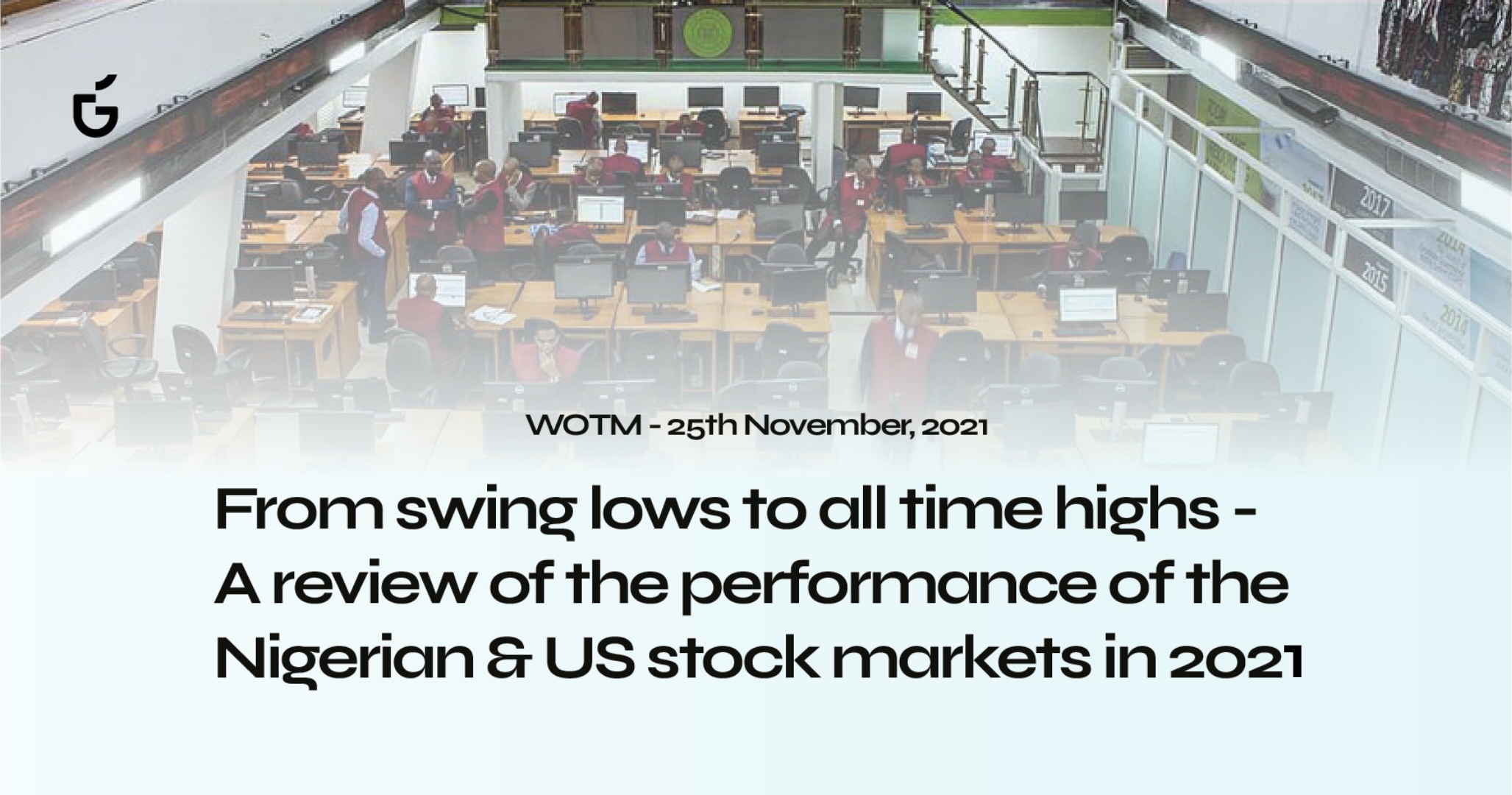 Africa
AfricaUnderstanding how companies are valued – A look into the MainOne acquisition
15 December, 2021
11 March, 2021 | 4 MINS READ
The narrative has shifted from what seemed to be a Nigerian economic downturn in 2020 with a slow chance of recovery to an economy exiting a recession. On the downside, the Naira currently holds a lower value than it did in 2019 and the inflation surge is inevitable.
That’s interesting! What led to the slight economic growth?
We believe growth in the non-oil sectors – Agriculture and ICT impacted the GDP (a monetary measure of goods and services produced in the country)
Gross Domestic Product (GDP) grew by 0.11% in Q4 2020 which is the first positive quarterly growth since Q1: 2020. This is a positive step as the country was expected to stay in recession until the fourth quarter of 2021.
Our focus for this review is to analyse the following questions and share our thoughts on what this means for an investor; How does Nigeria make money? What policies are in place to protect the value of the currency? How valuable is our currency compared to other countries?
How does Nigeria make money? If you said crude oil, you’re right on the money.
Nigeria’s largest source of revenue comes from the exportation of crude oil. That’s why the price of crude oil in international market influences the amount of money the country makes in a year. Crude oil prices are set by global supply and demand. OPEC (Organization of the Petroleum Exporting Countries) also influences the supply and price of oil prices.
Last year, we saw oil prices crash due to the global economic lockdowns to curb the spread of Covid-19, particularly in April. The result was plummeting revenues and increased debt for the country
Demand for crude oil has steadily gone up in figures, crude oil prices today are traded at even higher values than at the beginning of 2021. This year, oil prices appear to be kicking back up as most economies are active and back to work but OPEC is currently debating whether to restore the previous levels of output as the global economy recovers from the pandemic.
Analysts currently forecast crude oil prices to rise to $80 per barrel but this will largely be determined by crude oil output levels. A rise in crude oil prices is great for Nigerian and its ability to repay its loans.
Does the government have plans to stabilize the currency?
A major role played by the CBN (Central Bank of Nigeria) is to control the supply of money and stabilize the currency through its monetary and fiscal policies.
In 2020, CBN reduced the Monetary Policy Rate (MPR) from 13.50% to 12.50% and by September made another cut to 11.50% with the aim of boosting credit flow to important sectors of the economy. However, the CBN struggled with stabilizing inflation rates as it increased in its double-digit form in every quarter which was particularly driven by the consistent increase in prices of food.
As at January, 2021 inflation jumped from 15.75% to 16.47%. Today, the CBN is maintaining an expansionary policy by retaining MPR at 11.5% still in line to boost credit facilities to stimulate the economy. The goal is to boost liquidity in the economy by encouraging consumer spending through increased credit facilities in Nigeria. CBN does not seem to be focused on decreasing inflation now, so consumers still need to pay more to earn less, in other words, inflation is still reducing the value of the Naira at the rate of 16.47% today.
How valuable is the Naira compared to other currencies?
Naira officially exchanges for N379 to $1 and N484 to $1 in black markets. The Naira was devalued twice by the CBN in 2020 and a further devaluation of the Naira was expected in 2021 to satisfy the recommendations of the IMF loans taken in 2020.
Now, it is reported that the CBN disagrees with the recommendation to further devalue the currency to avoid worsening the current inflation surge, but a scheme has been pulled out to boost the availability of FX liquidity. This scheme has instructed banks to pay N5 for every USD1 remitted by a sender and collected by designated beneficiaries, this may stabilize the Naira but only time will tell.
In 2021, we see a gleam of hope in terms of the economy exiting a recession and the rise in crude oil price in international markets but we still have a long way to go in terms of stabilizing inflation rates and exchange rates to improve the value of the Naira.
What does this mean for you as an investor in Nigeria?
It’s time to sit tight. Re-balance your investment portfolio in a way that still accommodates growth. The 3- bucket approach to building an investment portfolio we teach in TGIC comes in handy here. You need a safety bucket. You need a growth bucket that earns you returns above the inflation rate or provides long term growth prospects. You need to diversify your portfolio across asset classes and currencies.
TGIC members know the drill and we support them with education, insight and credible investment opportunities that help them build investment portfolios that work. Not a member yet? You should join us. We’ll be happy to have you.
 Africa
Africa15 December, 2021
 Africa
Africa09 December, 2021
Join the biggest
investment club in Nigeria.